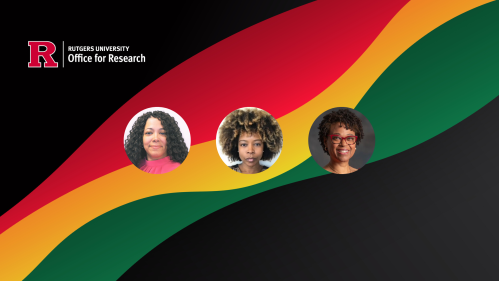The Office for Research Celebrates Black History Month

As part of our celebration of Black History Month and commitment to our values of diversity, equity, and inclusion, the Office for Research is highlighting three members of its incredible team who represent key areas of the services we offer to our community of researchers as part of our mission to support the research, scholarship, and creative endeavors of ALL Rutgers faculty. Malica Dock, Tunisia Lipford, and Vivian Thomas-McClain tell the story of their professional journeys, including their experiences, achievements, mentors, and what inspires them.
Accordion Content
-
IRB Reliance Assistant Director
Research Regulatory AffairsWhat is important to you about Black History Month?
Black History Month is significant to me because it provides a dedicated time for acknowledging and celebrating the rich history, achievements, and contributions of Black individuals throughout history. For me I look at it as a reminder of the resilience, strength, and accomplishments of the Black community despite historical challenges and the ongoing journey toward equality. The month of February is an opportunity for education, recognition, and the promotion for a more inclusive understanding of our collective history.
What is your role within the Office for Research, and what do you feel has been your top achievement supporting our researchers and students (if applicable) at Rutgers?
One of the most notable accomplishments during my tenure was co-leading our team in achieving the prestigious Association for the Accreditation of Human Research Program (AAHRPP) accreditation. This gold standard accreditation serves as a testament to our commitment to excellence and the protection of research participants. This achievement not only marked a significant milestone for the Institutional Review Board (IRB) but also underscored the dedication of the entire Office for Research to maintaining the highest standards in human research protection. I played an essential role in the successful merging of the IRB offices into a unified entity, streamlining procedures and processes across the entire IRB office. This strategic initiative aimed to enhance efficiency, improve collaboration, and provide a more cohesive experience for researchers and staff. My active participation in the Rutgers Senate has allowed me to actively engage in matters of general University interest. This role involves reviewing and making recommendations to the University administration, providing a valuable platform to advocate for the needs and perspectives of our researchers and staff.
Who has been your top mentor through your professional journey, and why?
While I haven't had one constant mentor, I've been fortunate to receive guidance and support from various individuals at different stages of my career. Each mentor has played a crucial role in shaping my professional development. From seasoned colleagues to industry leaders, their insights have collectively contributed to my growth. This diverse mentorship has provided me with a well-rounded perspective on navigating the complexities of the research regulatory field.
Who inspires you, and why?
My family has been a constant source of inspiration throughout my life. The unconditional love, selflessness, and the sacrifices made for the well-being of our family showcased the profound impact of a strong bond. Their enduring love and support serve as a guiding light, motivating me to overcome obstacles and strive for excellence. Their influence has shaped my drive and resilience in the faces of challenges in my professional pursuits.
Why is inclusion important to research?
Inclusion is pivotal in research as it brings together a diverse range of perspectives, experiences, and expertise. A research environment that embraces inclusion fosters creativity, innovation, and a broader understanding of complex issues ensures that studies are representative of the diverse populations they aim to serve. Inclusion in research is not only ethically imperative but also enhances the quality and impact of the work we do.
-
Associate Director, Research Contract Services
Research Contract ServicesWhat is important to you about Black History Month?
Black History Month is important to me because it is a time where black people are celebrated for their resilience, triumph, and contribution to this world despite of adversity and oppression. Black History Month is an acknowledgement that Black History is a part of not only American history, but world history. It is a time where people of all nationalities educate themselves about the enriched culture and communities of Black people and how we are reconciling with the past, our current struggles as a people, and our continuous fight for a more just future.
What is your role within the Office for Research, and what do you feel has been your top achievement supporting our researchers and students (if applicable) at Rutgers?
I began my journey within the organization as a Contract Assistant, and through hard work and dedication, I have progressed to the role of Associate Director, Research Contract Services within the Office for Research. I take pride in establishing and nurturing strong relationships not only with my colleagues, but with the executive leadership at the Cancer Institute of New Jersey and RWJBarnabas Health, which have been pivotal in opening many oncology studies, driving collaboration, and achieving our organizational goals.
Who has been your top mentor through your professional journey, and why?
For several years now, Melissa L. Matsil, JD has been my top professional mentor. She challenges me to be the best version of myself. There is no room for failure in her book. She is an encouraging leader with an incredible amount of faith in me and my abilities. Her leadership has made me strive to fulfil my true potential. Words can’t express how thankful I am for her guidance and support.
Who inspires you, and why?
My mother has had the strongest impact in my life and made me who I am today. I have found inspiration through her love, compassion, hard work, dedication, and sacrifices. In spite of having me at a young age, I never lacked for anything. I know it wasn’t easy for her as a single black mother, but she raised me effortlessly. She is the most kind, loving, selfless person and the essence of beauty and class. I have learned independence, emotional strength, self-love, and not to worry about negativity by just observing how she navigates through life. There is no greater role model and teacher in this world for me than my mother. I have tremendous love and respect for her, and I am forever grateful I get to call her mom.
Why is inclusion important to research?
Inclusion is important to research because it ensures that all types of people have equal opportunity to participate in studies, despite their background, gender, race abilities or identities. This helps avoid inaccuracies that may arise if certain groups of people are excluded from research opportunities.
-
Assistant Director, Award Setup and Accounts Receivable
Research Financial ServicesWhat is important to you about Black History Month?
Acknowledging the contributions and accomplishments of African American people in history creates space for all to remember and appreciate the past, and to learn and participate in the present. History that is not inclusive of all groups of people is not representative of truth, and there is liberation in truth.
Dr. James H. Cone states, “Indeed our survival and liberation depend upon our recognition of the truth when it is spoken and lived by the people. If we cannot recognize the truth, then it cannot liberate us from untruth. To know the truth is to appropriate it, for it is not mainly reflection and theory. Truth is divine action entering our lives and creating the human action of liberation.”
What is your role within the Office for Research, and what do you feel has been your top achievement supporting our researchers and students (if applicable) at Rutgers?
As one of four Assistant Directors in Research Financial Services, I oversee three critical areas: award set-up, letter of credit drawdowns, and accounts receivables. Each area is vital to the management of sponsored programs in support of Rutgers University researchers. A Principal Investigator can only begin their research after a grant is awarded and is setup in the financial management system with a project number to record expenses. This is a top priority for the researchers, as such, the team diligently strives to set up the awards promptly and accurately so that research can begin as soon as possible. The reimbursement of expenses and receipt of payments also are major priorities for the research community stakeholders. Attaining the goals of a quick turnaround for award setup with funds drawn and applied to the awards is a significant achievement in supporting researchers at Rutgers University.
Who has been your top mentor through your professional journey, and why?
I have been mentored by many people over my 25+ years in the research community at Rutgers University. I began my career in research as a grant accountant in the Division of Grant and Contract Accounting, which is now Research Financial Services, and have developed and advanced in administration, understanding and knowledge. I have gleaned insights and strategic problem-solving skills from each director, manager, and coworker over the years. The current executive leadership, Lamar Ogelsby, Dr. Jose Roman, and Dr. Mike Zwick have shown extraordinary interest in employees and have provided funding for participation in regional and national meetings for National Council of University Research Administrators, encouraged personal development, much more than other administrations, which is a welcomed change. I am a beneficiary of these initiatives, and I am grateful for the opportunities afforded me through their leadership.
Who inspires you, and why?
Educators inspire me: To name a few that are dear to me, Dr. Benjamin Elijah Mays, Dr. Bernadette Glover, Mrs. JoAnn Guest, Dr. Warren Dennis, and most importantly my parents Mr. and Mrs. George and Marion Thomas. Educators have a responsibility to impart wisdom, guide, and shape generations. Goals and dreams are imagined and visualized with the help of educators. One’s world can be enlarged or diminished by the input of an educator. The trajectory of one’s life can lie within the words spoken by an educator.
Dr. Benjamin E. Mays states, “The tragedy of life doesn't lie in not reaching your goal. The tragedy lies in having no goal to reach. It isn't a calamity to die with dreams unfulfilled, but it is a calamity not to dream...It is not a disgrace not to reach the stars, but it is a disgrace to have no stars to reach for. Not failure, but low aim is sin.”
Educators contribute to the making of goals, dreams, and our attempt to reach the stars.
Why is inclusion important to research?
Inclusion is important in all aspects of life, not only research. From researchers to human subjects involved in the research, diversity and inclusion must be exhibited to receive the full spectrum of ideas and collaborations for results that are applicable to all. Representation in research will enhance trust, and accountability, which will impact how the research findings are received by the communities that will benefit from the research being conducted.



